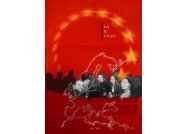turkish-greek civic dialogue - AEGEE Europe
turkish-greek civic dialogue - AEGEE Europe
turkish-greek civic dialogue - AEGEE Europe
You also want an ePaper? Increase the reach of your titles
YUMPU automatically turns print PDFs into web optimized ePapers that Google loves.
62<br />
countries and either publishing these interviews in newspapers or broadcasting<br />
them on TV: Newspapers and TV were preferred to reach large numbers of<br />
people. Each team member drew a “power map” and identified the people<br />
who can be interested in this issue and the people who can be target of group’s<br />
action. Then according to their potentials and capabilities, each member<br />
identified the action that he/she individually can take. We called our team<br />
“Prejudice Busters”.<br />
The resulting project was; to make interviews with war veterans and people<br />
who were from the “exchanged populations” and to publish them. Here the aim<br />
was not informing people about history or events; rather the aim was to make<br />
people aware about the veterans and exchanged populations, the experiences<br />
and the feelings of these people. We wanted people of both countries to<br />
understand that they were not the enemies who were forced to leave Greece<br />
and Turkey; that they were human beings with feelings; that they suffered<br />
from the exchange and that they still missed their native lands. The aim was to<br />
show the effects of exchange on people and to show that the experiences were<br />
similar in both countries.<br />
TEAM II: PREJUDICE/STEREOTYPES<br />
........................................................................................................... by Çiğdem Kotil<br />
We were five people who wanted to work on the issue of prejudice and<br />
stereotypes. We formed a team and Jason Becker coached us in this work.<br />
First we discussed what “prejudice” was as a concept and then we listed down<br />
prejudices about people of Greece and Turkey. In order to turn this list into a<br />
do-able project, we limited our goals to working with college students only.<br />
Afterwards, our coach helped us create an action plan with his questions. Our<br />
concrete plan was to choose universities in towns near the border: Edirne and<br />
Thessaloniki. Some of the residents of these towns used to live across the<br />
border. We planned to invite 50 students from social sciences departments<br />
to a summer school to take place in Edirne and Thessaloniki. To realize this<br />
goal, we decided to contact professors in these departments, student clubs,<br />
municipalities, local people and the local media: With their cooperation it<br />
would be possible to realize this project. To help students and professors meet<br />
and talk about the project, we decided to organize a dinner. Students coming<br />
to the summer school would be lodged at the grandparents of the students<br />
who would go the summer school across the border. This arrangement would<br />
put young people with their peers at the summer school and also put them in<br />
touch with the older generation from whom they could learn how things used<br />
to be in the older days. This way young people will work on issue of prejudice<br />
and stereotypes in the summer school with the new perspective and they will<br />
learn from the elders – a perspective very different from the nationalistic<br />
discourse.<br />
TEAM III: MEDIA<br />
.............................................................................................................. by Gülin Pasin<br />
We were five people who wanted to work on the negative role media has played<br />
in Greek-Turkish relations. We formed a team and Serdar M. Değirmencioğlu<br />
coached us in this work. It’s a well-known fact that the media is one of the<br />
most important tools nowadays to have a real influence on people. We have<br />
observed the positive, negative, constructive or destructives influences of the<br />
media on Turkish-Greek relations over the years. Our group decided to create a<br />
pressure group on media with the aim to improve the relations between Greece<br />
and Turkey. During the workshop, we made an analysis of all the institutions,<br />
agencies and individuals that we can influence through media and we decided our<br />
project duration as one month. Our working group composed of five youngsters<br />
decided to select the most efficient method that will lead us to a meaningful<br />
change in a month time. We classified different newspapers addressing to<br />
different segments of the society and we selected three newspapers addressing<br />
low income class and educationally disadvantaged areas as our target group.<br />
Our objective is closely monitoring the news published or to be published in<br />
these papers with the aim to examine whether the news include expressions<br />
promoting racism, nationalism, prejudices and to carry out various activities so<br />
as to have more constructive papers. Our concrete action plan is as follows:<br />
Arrange meetings with the chief-editors of newspapers to discuss<br />
regarding the articles published in the papers, to question the<br />
reality of the published articles and to receive their support for<br />
Turkish-Greek friendship<br />
Rebuilding Communication Association des Etats Généraux des Etudiants de L’<strong>Europe</strong>







